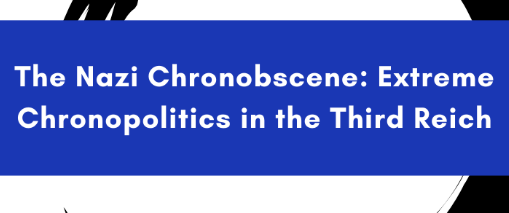
The Nazi Chronobscene: Extreme Chronopolitics in the Third Reich
The final years of the Third Reich witnessed the rise of a radical strain of chronopolitical discourse suggesting that a German defeat would spell the very end of history. History had only come into being under Hitler and it would perish with him. Ultimately, the war was a gigantic fireworks display in which a fatally accelerated “time without precedent” (Goebbels) was using up all its historical energy. This radical strain was there from the beginning of Nazism and survived its downfall.
The talk will analyze its peculiar logic by tracing and connecting several manifestations: the notion of terminal performance underlying the widespread abuse of the methamphetamine Pervitin; the idea of compressed morbidity guiding the future plans of Nazi insurance agencies to advocate a policy of senicide; the early literary prefiguration of the monopolization of history by the Third Reich in Katharine Burdekin’s 1937 dystopia Swastika Night; Hans Blumenberg’s philosophical take on Hitler’s final days; and, most importantly, the post-Stalingrad rhetoric of Joseph Goebbels, who in the wake of Hitler’s increasing absence becomes the principal purveyor of the Nazi chronobscene.
Geoffrey Winthrop-Young (MA Freiburg, PhD UBC) is Professor of German and Nordic Studies at the University of British Columbia.
* Reception to follow
